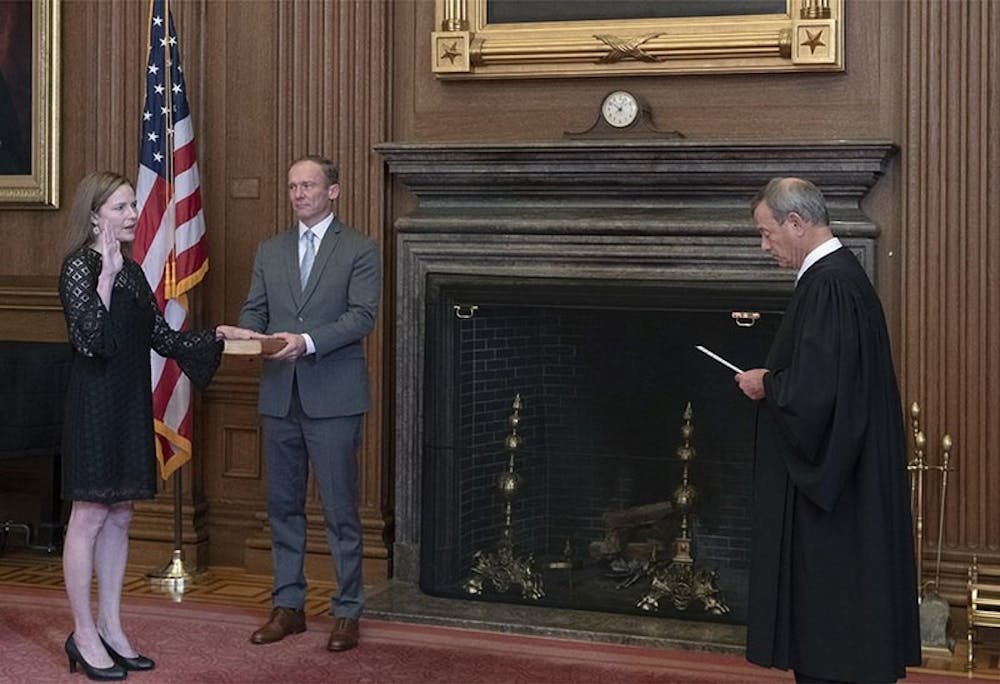Since the Senate Judiciary Committee confirmed Judge Amy Coney Barrett’s nomination to the Supreme Court, there has been an ongoing question of whether or not it is a win for feminism. Many conservative women have voiced their outrage that Barrett has not received support from the feminist movement. Additionally, they believe that women who are liberal or left-leaning are seen as feminist icons and are supported wholeheartedly by the feminist movement despite their flaws.
The basic definition of feminism is the belief that women and men should be equal in every economic, political and social facet of life. To be called a feminist, your values and actions should be in pursuit to end sexism and the oppression of women within the still-present patriarchal society. In addition, a feminist must work to empower and further the rights of women — especially women from marginalized groups — and not scale them back. Notwithstanding her legal success and achievements as a law professor, the definition of feminism and the necessary ideals to be categorized as a feminist are inherently missing in Barrett. In particular, Barrett’s views on healthcare and abortion rights prove that she is not fighting for women.
The Affordable Care Act — which granted insurance access to millions — is now at stake with Barrett on the Court. From a 2017 essay exhibiting her disapproval of Chief Justice John Roberts’ decision to uphold the ACA, it is clear that she does not believe the act is constitutional. While a decision by Barrett to strike down the ACA would affect millions of Americans across the country, it greatly affects women and their fundamental right to healthcare. Under the ACA, healthcare providers cannot deny insurance coverage to US citizens with pre-existing medical conditions. If the ACA were struck down by the Supreme Court, health insurance companies could refuse healthcare coverage to women based on the “pre-existing condition” of pregnancy. In addition, the complete revocation of the ACA would no longer require that healthcare providers cover the costs of contraception and counseling for American women. Therefore, Barrett’s view that the ACA or aspects of it should be struck down is working against the rights of women’s well-being and their bodies. A woman cannot be a feminist if she actively wants to dismantle a law that gives women autonomy over their bodies and the right to affordable healthcare whether or not you have children.
With Barrett on the Court, the decades-long decision of Roe v. Wade — that protects the right to privacy for women’s reproductive rights — is also at stake. On multiple occasions — despite her refusal to answer any questions about her previous statements or opinions in front of the Senate Judiciary Committee — her judicial decisions and comments have been pro-life and against the decision of Roe v. Wade. Barrett has stated that Roe v. Wade “permitted abortion on demand” and “recognizes no state interest in the life of a fetus,” as well as, “abortion is always immoral.” Additionally, she argued to uphold an Indiana law that required minors to ask their parents permission for an abortion, a law that mandated fetal remains be cremated or buried and has demonstrated that she agreed with Justice Antonin Scalia’s disapproval of the decision in Roe v. Wade. Nevertheless, it is not just her record that displays her views on abortion. President Donald Trump has continuously stated that he would put judges on the Supreme Court that will reverse Roe v. Wade, and she was one of the chosen judges. She also is receiving a lot of support from pro-life groups across the country. Therefore, if a case about the right to abortion in the United States comes before the Court, Barrett will likely vote to reverse Roe v. Wade. The right for a woman to have a safe and legal access to abortion services — providing autonomy over their own body and reproductive systems — is a staple of feminist ideals. A woman should have the right to choose no matter the situation. Since Barrett threatens a woman’s right to choose and hinders the rights of women across the United States, she can not be described as a feminist under any definition.
And finally, the statement that powerful women are only deemed feminists if they have left-leaning ideology is inherently false. The very first female Supreme Court justice — Justice Sandra Day O’Connor — was a moderate to right-leaning judge on the court. However, she was revered as a feminist icon because she brought the Equal Rights Amendment to the Arizona Legislature, worked to strike down gender-discriminatory laws through Arizona and was pro-choice. O’Connor spent her whole life fighting to not only be the first woman to be appointed to the Supreme Court, but also to be an advocate for women’s rights both on and off the bench. The same cannot be said — under any circumstances — about Barrett.
To be a feminist, you must fight for the equality of women and use your power and position to further women’s rights. Barrett has not done this in neither her papers nor her judicial decisions. It is hard to believe that her actions will change — and she can be called a feminist — when hearing cases as the 115th justice to the Supreme Court.
Evelyn Duross is an Opinion Columnist for The Cavalier Daily. She can be reached at opinion@cavalierdaily.com.
The opinions expressed in this column are not necessarily those of The Cavalier Daily. Columns represent the views of the authors alone.







